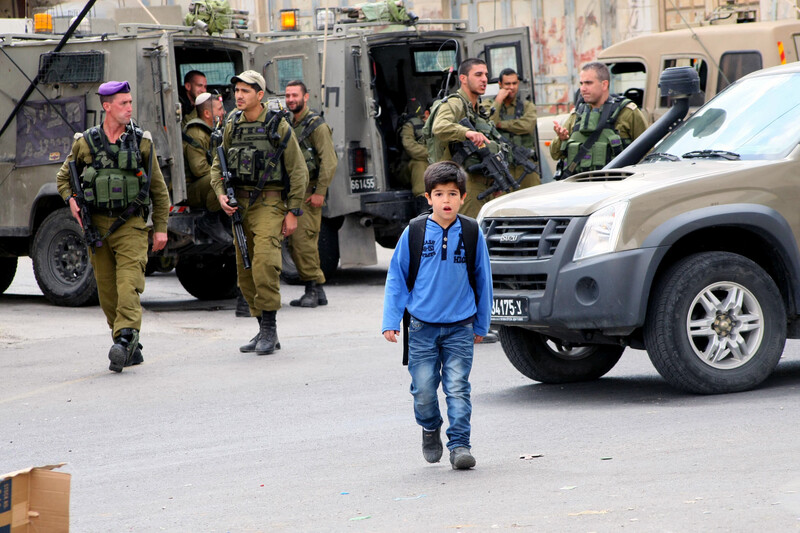Rights and Accountability 30 September 2013

A Palestinian schoolboy walks in front of Israeli occupation forces in the West Bank city of Hebron on 24 September 2013.
APA imagesIsraeli occupation authorities have denied entry to a member of the Christian Peacemaker Teams (CPT), an organization that has monitored Israeli abuses against Palestinians in the occupied West Bank City of Hebron for almost two decades.
While this is not the first time individual members of CPT have been denied entry, it is apparently the first time occupation forces have cited CPT’s activities as the reason.
The timing could also be significant, as Israel has mounted a brutal crackdown and arrest campaign against residents of Hebron ever since an Israeli occupation soldier was shot dead in the city on 22 September.
Alice Su reports for Middle East Monitor:
Jonathan Brenneman packed for his second attempt at crossing the Jordan-West Bank border with a jacket, fully charged iPod, letters of official invitation and 500-page collection of Flannery O’Connor stories.
The lanky 25-year-old from St. Mary’s, Ohio had spent nine hours under Israeli border authorities’ questioning just a few days ago. They denied him entry, saying he needed more proof of his purposes in the country. Brenneman prepared better this time around, eating a large breakfast before leaving his uncle’s house in Amman.
Six hours later, Brenneman came back once again.
Brenneman has been volunteering for a year with Christian Peacemaker Teams (CPT), a faith-based organization that supports peacemaking in conflict areas. CPT has worked in Hebron for nineteen years, where their main activity is walking children to school to protect them from settlers’ attacks. The volunteers leave every three months to renew their visas and to tell stories about CPT work back home.
This time, Israeli authorities have denied Brenneman’s return.
“They told me it’s because CPT is ‘not recognized by Israel,” Brenneman says. “I asked why that’s a problem if our work is legal, but the soldier just said ‘My commander says you are not allowed.’ That was the end.”
Brenneman tweeted an image of his passport with an Israeli stamp denying him entry:
Denial of entry
Israeli forces frequently and arbitrarily deny entry to Palestinian Americans as well as to other US citizens and foreign nationals.
While the occupation authorities do not always give a reason, those targeted have included individuals who have written, spoken at, or taken part in activities in opposition to Israeli oppression of Palestinians.
At the same time that it discriminates against Palestinian Americans through frequent denial of entry, Israel discriminates in favor of Jewish Americans who come to Palestine to live, become settlers or to participate personally in Israel’s violations of Palestinian rights, including by joining the army.
Brenneman wrote on his blog that during his first attempt to enter an Israeli soldier asked him, “Your last name is Brenneman, any chance [you’re] Jewish?” Brenneman wrote that he is not Jewish.
This kind of religious and racial discrimination and profiling has become a major issue in Israel’s attempts to join the US Visa Waiver program which would allow Israeli passport-holders to enter the United States without obtaining visas in advance.
Abuses in Hebron
Hebron, where CPT in Palestine is based, is a Palestinian city in the occupied West Bank with a population of more than 160,000.
CPT, which has been present in Hebron since 1995, monitors checkpoints in the morning as Palestinian teachers and students walk through, often facing violence and harassment.
Brenneman told Middle East Monitor: “When there’s an outside set of eyes, soldiers are far less aggressive … It’s kind of sad how racist it is. But, yeah, just having a white person there makes a difference.”
I spoke to members of CPT in Hebron last week who gave an eyewitness account of settlers gathering around a Palestinian family home previously seized and occupied and which the settlers want to seize again.
A few hundred Israeli settlers, among the most extreme and racist, have steadily been taking over the heart of Hebron with the protection and assistance of Israeli occupation forces.
Under a 1997 agreement between Israel and the Palestinian Authority, Hebron was partitioned into two zones: “H1” and “H2.”
H1 is nominally administered by the Palestinian Authority and is home to more than 120,000 Palestinians.
H2, under full Israeli military rule, includes Hebron’s historic Old City as well as the Ibrahimi Mosque in which the settler Baruch Goldstein massacred 29 Palestinian men and boys in February 1994.
Israeli occupation forces severely restrict the movement of more than 30,000 Palestinians in H2 while Israeli settlers move about freely under army protection.
Palestinians in the city face frequent violent attacks from soldiers and settlers.




